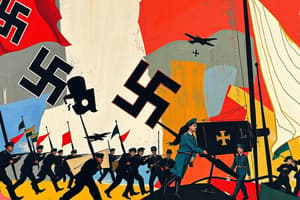Podcast
Questions and Answers
Who was the leader of the Soviet Union during World War II?
Who was the leader of the Soviet Union during World War II?
- Winston Churchill
- Franklin D. Roosevelt
- Joseph Stalin (correct)
- Adolf Hitler
What was the estimated number of fatalities during World War II?
What was the estimated number of fatalities during World War II?
- 50-80 million (correct)
- 20-30 million
- 100-150 million
- 200-250 million
What was established in 1945 to promote international cooperation and prevent future conflicts?
What was established in 1945 to promote international cooperation and prevent future conflicts?
- The United Nations (correct)
- The Soviet Union
- The European Union
- The League of Nations
Which of the following leaders played a key role in rallying the British people during World War II?
Which of the following leaders played a key role in rallying the British people during World War II?
What was the period of political and ideological rivalry between the United States and the Soviet Union from 1945 to 1991?
What was the period of political and ideological rivalry between the United States and the Soviet Union from 1945 to 1991?
What was a major consequence of the Treaty of Versailles on Germany?
What was a major consequence of the Treaty of Versailles on Germany?
What event marked the beginning of World War II?
What event marked the beginning of World War II?
Which of the following was a major turning point in World War II?
Which of the following was a major turning point in World War II?
What was the consequence of Japan's attack on Pearl Harbor?
What was the consequence of Japan's attack on Pearl Harbor?
Who was the fascist dictator of Italy during World War II?
Who was the fascist dictator of Italy during World War II?
Flashcards are hidden until you start studying
Study Notes
Causes of World War II
- The Treaty of Versailles (1919) imposed harsh penalties on Germany, leading to widespread resentment and a desire for revenge.
- The global economic crisis of the 1930s (The Great Depression) led to high levels of unemployment and poverty, creating an environment in which extremist ideologies could thrive.
- The rise of fascist and nationalist ideologies in Europe, particularly in Germany, Italy, and Japan.
Key Events of World War II
- Invasion of Poland (1939): Germany, under Adolf Hitler, invaded Poland, leading to the declaration of war by France and the United Kingdom.
- Battle of Britain (1940): The German air force (Luftwaffe) launched a campaign to gain air superiority over the UK, but the British Royal Air Force (RAF) successfully defended the skies.
- Operation Barbarossa (1941): Germany launched a surprise attack on the Soviet Union, leading to a prolonged and costly campaign on the Eastern Front.
- Pearl Harbor (1941): Japan launched a surprise attack on the US naval base at Pearl Harbor, drawing the United States into the war.
- D-Day (1944): Allied forces launched a massive invasion of Nazi-occupied France, marking a turning point in the war.
Major Players and Their Roles
- Adolf Hitler (Germany): The dictator of Germany, who pursued an aggressive expansionist policy, leading to the outbreak of war.
- Benito Mussolini (Italy): The fascist dictator of Italy, who allied with Germany and Japan.
- Joseph Stalin (Soviet Union): The leader of the Soviet Union, who initially allied with Germany before switching sides after the invasion of the Soviet Union.
- Winston Churchill (UK): The Prime Minister of the United Kingdom, who played a key role in rallying the British people and leading the Allied effort.
- Franklin D. Roosevelt (USA): The President of the United States, who led the country through the Great Depression and World War II.
Consequences of World War II
- Casualties and Destruction: An estimated 50-80 million fatalities, widespread destruction, and displacement of millions of people.
- Formation of the United Nations (1945): The establishment of the United Nations, aimed at promoting international cooperation and preventing future conflicts.
- Cold War (1945-1991): The emergence of the United States and the Soviet Union as superpowers, leading to a decades-long period of political and ideological rivalry.
Studying That Suits You
Use AI to generate personalized quizzes and flashcards to suit your learning preferences.




